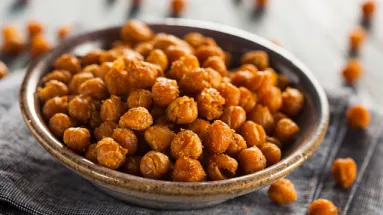Foods that may help with swelling and lymphedema
Foods that may help with
swelling and lymphedema
Foods that may help with
swelling and lymphedema

Lymphedema is an abnormal buildup of fluid that generally occurs in the soft tissue of arms or legs, although fluid can pool in other areas of the body as well. Lymphedema can occur for a number of reasons, but as it relates to cancer treatment, lymphedema is commonly caused by damage to or removal of your lymph nodes, small glands that filter out bacteria and other potentially harmful compounds. Surgery, radiation or the cancer itself can cause damage to these glands.
While the onset of lymphedema may be caused by factors out of your control, there are dietary and lifestyle factors that may improve your symptoms and reduce discomfort associated with this condition.
Melissa Rifkin, a registered dietitian, breaks down nutritional choices that may help with lymphedema.
Maintaining a healthy weight
Maintaining a healthy body weight may help reduce your risk of lymphedema. If you are overweight, talk with your physician and oncology team dietitian to determine what a healthy weight is for you and consider the following steps to make progress toward weight loss:
- Fill up on fruits and vegetables. These foods provide many healthy benefits with few calories. Aim for at least two and a half cups of produce each day
- Choose grilled or baked lean proteins, like fish or poultry, and use higher fat meat, like beef and pork, sparingly. Also consider low-sugar Greek yogurt and cottage cheese for versatile lean proteins
- Choose carbs like sweet potatoes, beans, brown rice and oatmeal, which have fiber. Fiber will help you feel full longer, which can lead to smaller portion sizes and less snacking throughout the day
- Consider drinking fewer sugar-sweetened beverages like soda, juice, sweetened tea and coffee, energy drinks and lemonade. Instead, use fruit and herbs, like mint, to flavor your water; plant-based zero calorie sweeteners, like stevia, in your tea and coffee and swap the soda for flavored carbonated water
Ingredients to focus on
Inadequate protein intake may weaken connective tissues and negatively impact your lymphedema, so it is important you are consuming lean proteins, like the ones listed above. You can also get protein from plant-based sources, like nuts, seeds, beans, edamame and soy foods.
Sodium is a nutrient that plays a role in fluid balance. According to an article from Cure Today, “There are no official guidelines for avoiding salt for lymphedema; however, people who are sensitive to salt might [make symptoms worse] if they eat high-sodium foods.” Limit the amount of salt you add to food and check sodium content on canned items, frozen convenience meals and store-bought sauces and dressings. When ordering at a restaurant, ask them to “go light” on the salt.
There is no one food or ingredient responsible for causing lymphedema; however, taking care of your body as a whole and using nutrition to achieve a healthy weight and minimize additional water retention can encourage healing.
The information contained herein is provided for educational purposes only and is not intended to replace discussions with a healthcare provider. All decisions regarding patient care should be made with a healthcare provider.
Melissa Rifkin, MS, RD, CDN, is a registered dietitian from New York City where she has spent the last 10+ years working in oncology, surgery and bariatrics. She holds a bachelor’s degree in dietetics and a master’s degree in clinical nutrition. Melissa enjoys sharing her knowledge of nutrition and overall well-being through her Instagram account (@confessionofadietitian).













